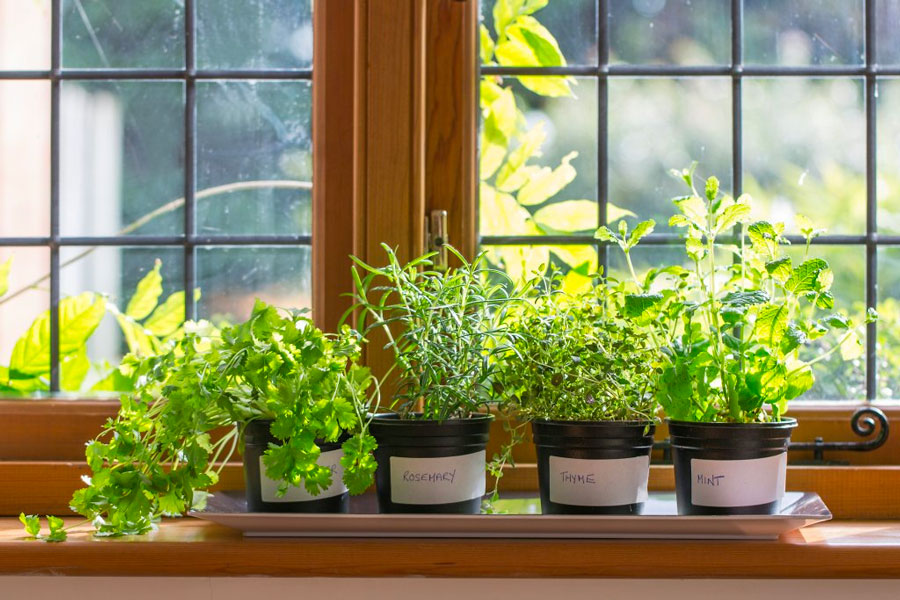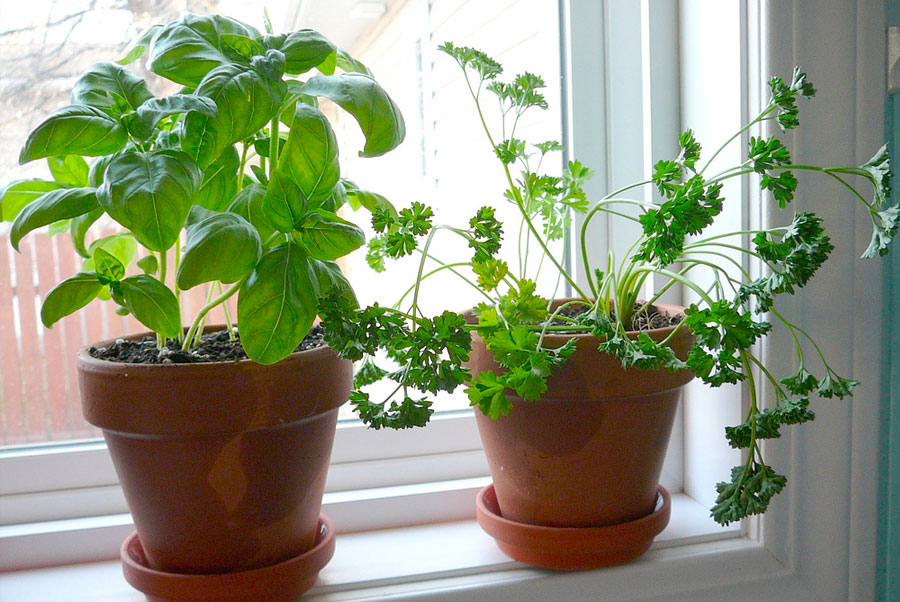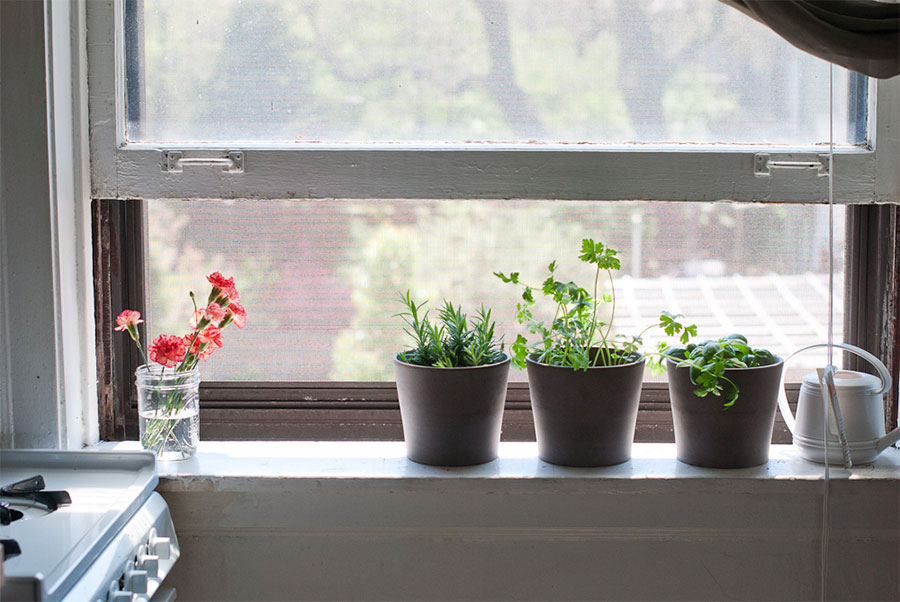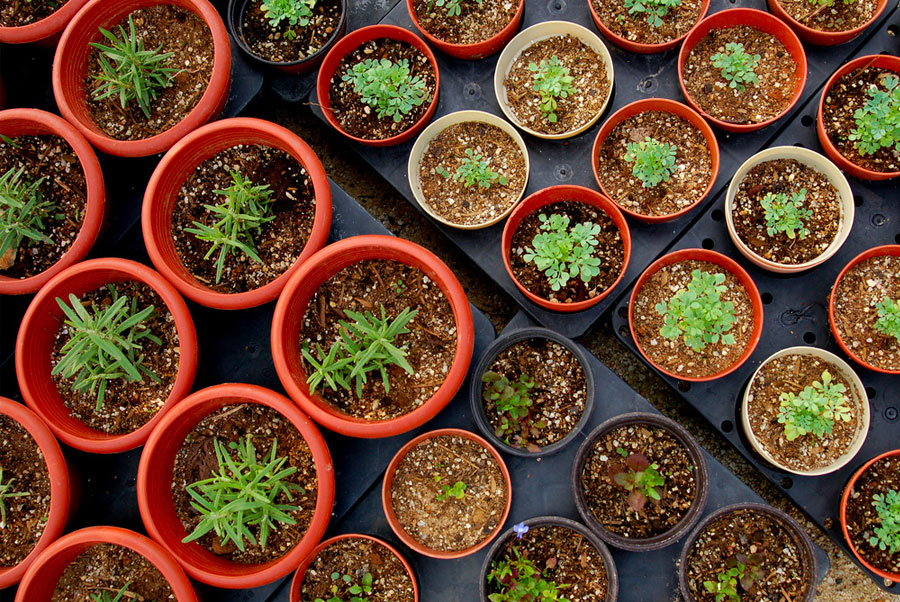Aside from gardening, one of my favourite pastimes is whipping up tasty dishes in the kitchen, and after much trial and error, I have learned to make the most of herbs to add an extra bit of flavour to my creations. I used to spend so much money on those jars of herbs from the supermarket, and some of them certainly aren’t cheap, before coming to my senses and deciding to grow my own. I tend to grow herbs in pots, but you can use just about any container you like as long as you pay attention to the tips we’ve offered up in our ‘container’ section below.
The vast majority of herbs will grow in pots, and do so well without too much care being needed from yourself other than basic maintenance. They can also be grown in pots both indoors and out, so if you are pushed for space, or you simply don’t have a garden, growing herbs in pots is still possible from your windowsill or balcony.
In this article we will explain all you need to know about growing herbs in pots in the UK, and soon have you on your way to enjoying some home grown mint, basil, thyme, and many other delicious additions to add to your lunch or dinner.
Growing herbs in pots: Choosing prepping your pots
As already stated, you can use a wide range of containers for growing herbs, from hanging baskets to converted buckets, but for the sake of simplicity we are going to concentrate on growing herbs in pots here today. Pots of pretty much any material are fine for growing herbs, but if you are going to use terracotta pots, you might find that you get too much moisture evaporating. The way to counter this is simple though, and you just need to line the pots with some kind of plastic bag that has a hole in the bottom.

For all other types of pots, it is important there are drainage holes in the bottom. Multiple smaller holes are better as they allow drainage without having all the contents dropping out onto the floor. You can always create your own drainage holes if there aren’t any already. Simply grab a drill and a small bit and make a few in the bottom. Don’t forget to grab some stones and create a small layer in the bottom of the pot, you can also use grit for this, and then you are ready to add your compost.
A good option for your pots, is to choose one’s that are quite deep, so that the herbs can be left to grow without having to change containers later. However, some herbs are annuls, such as basil will need too be changed every year.
Which compost is best for growing herbs in pots?
For growing herbs in pots, choosing a soil-based compost is your best bet due to way it retains moisture better than other types. Also using loam-based composts mixed with grit to around a quarter of the overall volume can work well. If you use peat-based compost, you will probably find that you struggle to keep it moist during spells of dry and hot weather.
How to care for your herbs growing in pots
Herbs growing in pots don’t require anything special to keep them growing, but they do require a little more attention compared to ones grown directly in the earth. The main thing to keep an eye on is moisture levels. Herbs growing in pots are more likely to suffer from under or overwatering, especially the former.
Make sure you check the soil so that it is just moist without being sodden, and check even more regularly during hot and dry spells so that the herbs don’t suffer from a lack of water. Some herbs do better in slightly shaded areas than in direct sunlight, while others are the opposite, so if you are panting multiple herb types in the same pot, they should be ones that enjoy similar growing conditions. Nearly all, however, will not benefit from being left in the direct sunlight for long periods of time, and this will actually damage the plants.

One of the advantages of growing your herbs in pots though, is that it is easy to pick them up and move them to a more sunny or shady spot as you see fit. You should feed your herbs to keep them healthy and leafy, and we suggest using a fertiliser that has a balanced ratio to it and avoid high potassium content fertilisers. You could also use seaweed as an organic fertiliser choice.
Feeding your herbs once a week should suffice.
In winter, you can either bring them indoors, such as in your greenhouse or even just on your windowsill, or alternatively, you could wrap the pots with something to insulate them and thus prevent the roots of your herbs from freezing.
Good choices of herbs for growing in pots in the UK

Basil
Basil can be added to pretty much any pasta sauce to instantly improve it, or simply place a few fresh leaves on top of your pizza as a tasty garnish. If you’re feeling a little more adventurous, grab some pine nuts and olive oil and have a go at making your own pesto. It is best to water basil in the morning and place it in a bright and warm spot that is sheltered from cold winds. The sol should be moist, but well-drained, and never soggy, especially at night.
Mint
Who doesn’t love mint? It can be used in so many different ways, and is quite a hardy little plant, even growing well in conditions that many other herbs couldn’t handle, such as places with a lot of shade. The flip side of this, is that mint will grow quickly and take over most, if not all in the pot, so it is best planted in a large pot of its own. To keep your mint at its best, remove it from its pot each spring, spilt it in half, and then replant in two separate pots filled with fresh compost.
Parsely
Great to add to sauces, especially ones to eat with fish, parsley can provide you with a couple of years’ worth of leaves to cook with before dying off. It can be a slow starter, but I think it’s definitely worth the wait. There are different types of parsley available, so do a little research before deciding on what to plant.
Chives
Chives are another herb that grows easily, and doesn’t require more than half a day’s worth of sun at the most. In fact, too much sun will probably cause the plant problems, so make sure you keep it well watered in the warmer parts of the year. Chives are great for creamy sauces, for garnishing dishes, or for adding to soups, as their flavour is fairly subtle, and they don’t really react well to being over cooked. One of my favourite things to make is creamy, cheddar and chive mash potatoes. Absolutely delicious with fresh chives.
Rosemary and thyme
These herbs go so well together that I decided to feature them together here too. Rosemary is quite a strong flavour when compared to thyme, but when used sparingly to season meats, in addition to some thyme, it can be absolutely fantastic.
Both of these herbs like well drained soil, and sunny, sheltered spots to grow in.
These are just a small example of the herbs that you can grow in pots in the UK, but there are many others available to you if you want to get more adventurous with your growing and cooking. We hope you found this article informative and helpful, and also hope you’ll be back to check out some of our other pages on this very site. Until next time.
